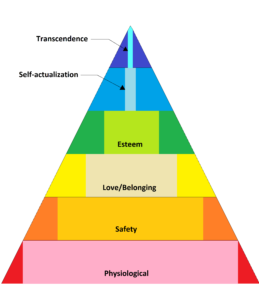Maslow loved Hierarchies. In a future book I will go into details about this love affair, but for now it would be sufficient to say that it was his favorite way to describe complex subjects. There was of course his famous hierarchy of needs, and then this hierarchy was broken down to sub hierarchies of deficiency needs or growth needs and then there were hierarchies of peak experience, of happiness, of frustration, etc. In this chapter we will examine the complete story of the Hierarchy of needs. You will have a chance to examine a diagram that most accurately reflects a comprehensive perspective on Human Needs
The Deficiency needs
Maslow’s motivational theory can be represented by a Six tier model of human needs/motivations. These needs are prepotent meaning that the more basic (lower) needs must be satisfied( not completely fulfilled) before you can focus more of your interest and energy on to the higher needs. The first four levels( physiological, safety ,love, and esteem are called Basic or Deficiency needs. These needs arise from our inherent nature and will preoccupy us until satisfactorily gratified
Maslow called the Basic Needs deficiency needs because they needed to be substantially fulfilled in order for you to progress on the journey of becoming fully human. With the basic needs satisfied you could now focus on actualizing your capacities and potentialities and maybe even make forays into transcendence(more about that later.) Maslow described this process of addressing deficiency needs then growth needs in the following way:
“Where it( behavior) is primarily deficiency-motivated, it is more need-reductive, more homeostatic, more the relief of felt deficit. When behavior is more growth-motivated, it is less need-reductive and more a movement toward self-actualization, it is less need-reductive and more a movement toward self-actualization and fuller humanness, more expressive, more selfless, more reality-centered.” —Abraham Maslow (The Psychology of Science, pg. 22) By definition, self-actualizing people are gratified in all their basic needs (of belonging, affection, respect, and self-esteem). This is to say that they have a feeling of belonging and rootedness, they are satisfied in their love needs, have friends and feel loved and love-worthy, they have status and place in life and respect from other people, and they have a reasonable feeling of worth and self-respect.” (pg. 299) Farther



